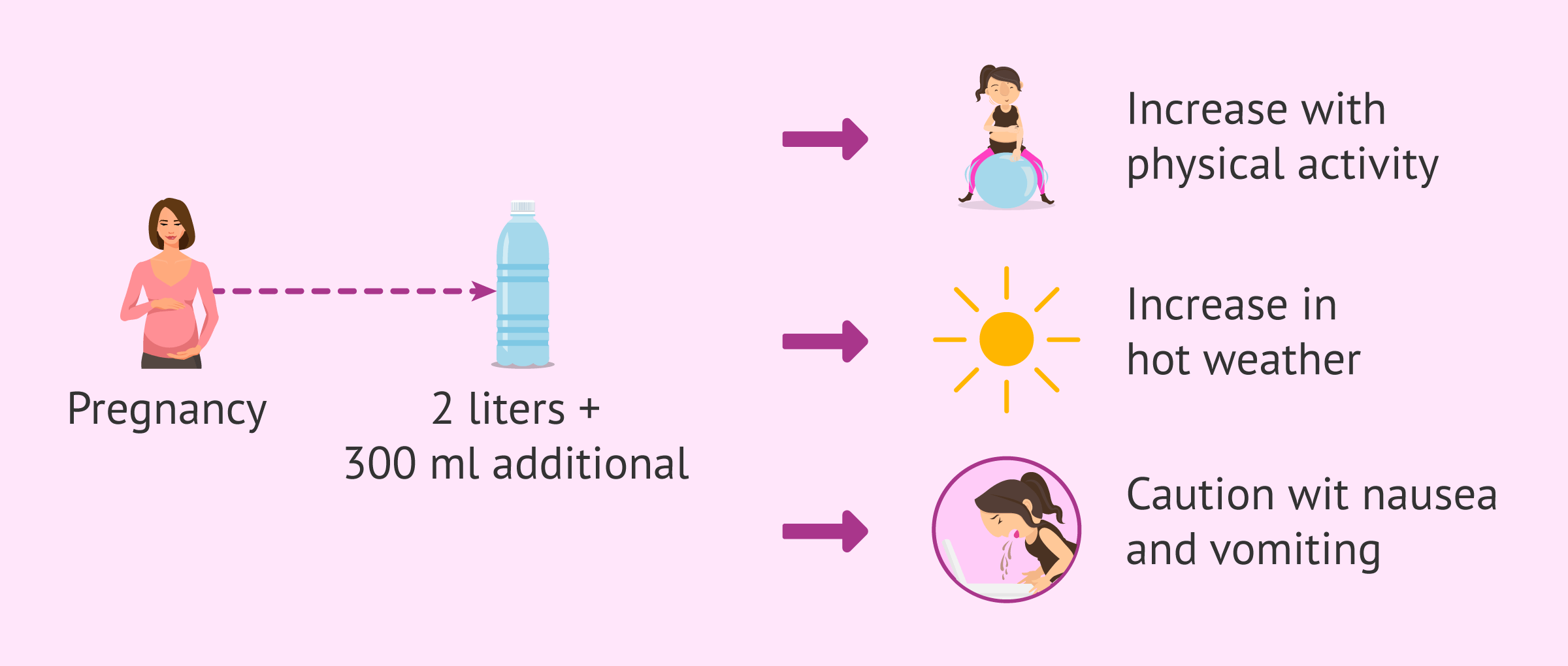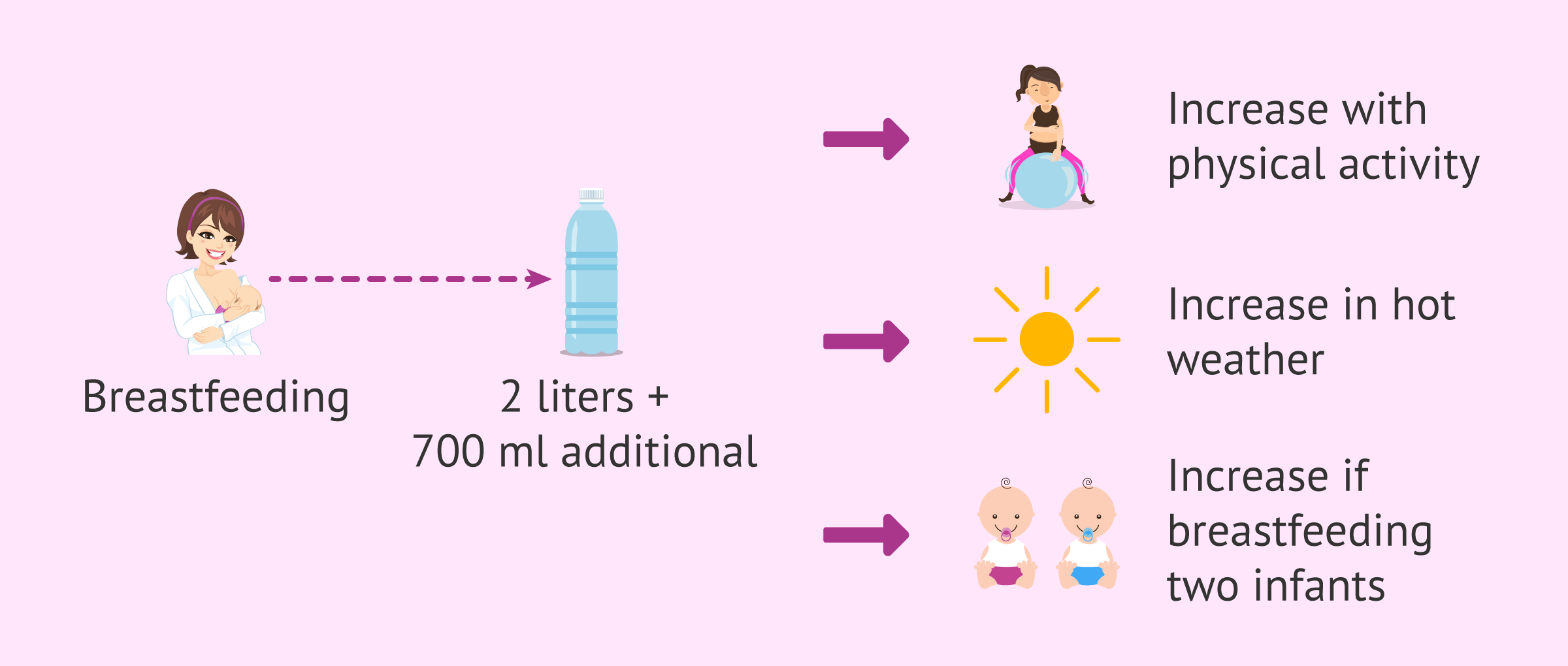Water is essential in any period of our life and staying hydrated is fundamental for the correct functioning of our organism. However, water intake becomes more important during certain periods such as pregnancy and lactation.
A pregnant woman will need a higher water intake, as well as during breastfeeding, due to the physiological changes that occur in her body in these special stages of life.
Provided below is an index with the 6 points we are going to expand on in this article.
Water in pregnancy
A woman with a body mass index (BMI) between 18.5 and 24.9 before pregnancy (in the range considered normal weight) should gain between 11.5 and 16 kilograms during pregnancy. Of this weight gained by a woman during pregnancy, a large part is water (about two thirds).
This is because, in pregnancy, blood volume increases. In this way, the vascularization of the placenta is allowed without compromising the blood supply to the other organs of the pregnant woman.
In addition, water is necessary for the production of the amniotic fluid that protects the fetus, not to mention that the placenta or the developing baby itself has a high water content.
How much water to drink during pregnancy?
The most widespread recommendation is that women should increase the recommended 2 liters of water per day by an additional 300 ml during pregnancy. However, this recommendation is very general. It should be taken into account that factors such as a warm climate or physical activity increase water loss and, therefore, the requirements would be greater, without forgetting that the loss through sweating is increased during pregnancy.
On the other hand, the vomiting that is so common in the first trimester of pregnancy contributes to the woman losing more water, which can be aggravated if the pregnant woman reduces her water intake due to nausea. In addition, in hyperemesis gravidarum (constant nausea and vomiting in pregnancy) there is a risk of severe dehydration and the woman should see a specialist before this occurs.
It is important to promote the consumption of water for hydration during pregnancy and not to replace it with sugary drinks that can lead to excessive weight gain during pregnancy. However, fruits and vegetables with a high water content should be part of the healthy diet of pregnant women and, in addition, contribute to water intake.
Finally, it is best to drink this amount of water little by little and even drink these small sips before you feel thirsty.
Benefits of drinking water in pregnancy
Staying properly hydrated in pregnancy helps maintain amniotic fluid balance, reducing the risk of developing oligohydramnios(low amniotic fluid).
In addition, it also reduces the risk of urinary tract infections and, together with a diet rich in fiber, adequate water intake could alleviate the constipation typical of pregnancy and, thus, prevent the appearance of hemorrhoids.
However, water intake may also help alleviate fluid retention and the associated swelling of the ankles and is beneficial for maintaining skin hydration and elasticity, thus preventing the appearance of stretch marks.
Drinking water during lactation
It is not only important to take care of hydration during pregnancy, but also after giving birth. During lactation, and taking into account that more than 85% of breast milk is water, it is important to have a correct water intake to compensate for the loss due to milk production.
The general recommendation is to add an additional 700 ml of water daily to the recommended intake of 2 liters. The reason is that, although it increases progressively, after six months of exclusive breastfeeding a woman produces about 780 ml of milk per day. This may vary, for example, if the woman is breastfeeding twins, which means more water loss for the mother.
Similarly, physical activity and living in a warm climate are factors to be taken into account, as they increase a woman's water requirements.
However, during lactation and, in particular, at the time of breastfeeding, it is common for women to experience a sensation of thirst. Therefore, a good tip is for the woman to have a glass of water nearby when she is going to breastfeed the baby, to promote intake and avoid dehydration.
As for the baby, breast milk covers all its requirements during the first six months of life, so it is neither necessary nor advisable to offer water during this period.
FAQs from users
Can I drink tap water when I am pregnant?
The quality of tap water may vary between different areas and have, for example, a high lime content. In addition, chemical compounds resulting from disinfection of the water with chlorine may also be a cause for concern.
For this reason, many specialists advise drinking natural mineral water as a safer option. In addition, this type of water provides minerals and trace elements that are beneficial for pregnancy.
What drinks can be drunk while pregnant?
It is best to promote the consumption of water during pregnancy, avoiding substituting it with sweetened or sweetened beverages.
On the other hand, alcohol consumption should be totally avoided during pregnancy, because it may pose risks to the developing baby. Similarly, coffee and tea consumption should be reduced.
Natural juices can be a good option, although it is healthier to drink uncrushed fruit. Fresh fruits and vegetables contribute to proper hydration.
Suggested for you
If you are interested in learning more about how to eat and what diet to follow during pregnancy, you can access the following link: What to eat during pregnancy - How to have a healthy diet.
On the other hand, if you already have your baby and want to know how your diet should be during breastfeeding, we recommend you read this article: Feeding and nutrition of the mother during lactation.
We make a great effort to provide you with the highest quality information.
🙏 Please share this article if you liked it. 💜💜 You help us continue!
References
Azarkish F, Janghorban R, Bozorgzadeh S, Arzani A, Balouchi R, Didehvar M. The effect of maternal intravenous hydration on amniotic fluid index in oligohydramnios. BMC Res Notes. 2022 Mar 7;15(1):95. doi: 10.1186/s13104-022-05985-6. PMID: 35255952; PMCID: PMC8900343. (View)
Champion ML, Harper LM. Gestational Weight Gain: Update on Outcomes and Interventions. Curr Diab Rep. 2020 Feb 27;20(3):11. doi: 10.1007/s11892-020-1296-1. PMID: 32108283. (View)
Lowe SA, Steinweg KE. Review article: Management of hyperemesis gravidarum and nausea and vomiting in pregnancy. Emerg Med Australas. 2022 Feb;34(1):9-15. doi: 10.1111/1742-6723.13909. Epub 2021 Dec 6. PMID: 34872159. (View)
Mulyani EY, Hardinsyah, Briawan D, Santoso BI, Jus'at I. Effect of dehydration during pregnancy on birth weight and length in West Jakarta. J Nutr Sci. 2021 Aug 27;10:e70. doi: 10.1017/jns.2021.59. PMID: 34527228; PMCID: PMC8411261. (View)
Rosinger AY, Bethancourt HJ, Pauley AM, Latona C, John J, Kelyman A, Leonard KS, Hohman EE, McNitt K, Gernand AD, Downs DS, Savage JS. Variation in urine osmolality throughout pregnancy: a longitudinal, randomized-control trial among women with overweight and obesity. Eur J Nutr. 2022 Feb;61(1):127-140. doi: 10.1007/s00394-021-02616-x. Epub 2021 Jul 3. PMID: 34218315; PMCID: PMC8720908. (View)
Rush EC, Plank LD, Lubree H, Bhat DS, Ganpule A, Yajnik CS. Gains in body mass and body water in pregnancy and relationships to birth weight of offspring in rural and urban Pune, India. J Nutr Sci. 2022 Sep 9;11:e75. doi: 10.1017/jns.2022.75. PMID: 36304819; PMCID: PMC9554425. (View)
Zhang N, Zhang F, Chen S, Han F, Lin G, Zhai Y, He H, Zhang J, Ma G. Associations between hydration state and pregnancy complications, maternal-infant outcomes: protocol of a prospective observational cohort study. BMC Pregnancy Childbirth. 2020 Feb 7;20(1):82. doi: 10.1186/s12884-020-2765-x. PMID: 32033597; PMCID: PMC7006388. (View)
FAQs from users: 'Can I drink tap water when I am pregnant?' and 'What drinks can be drunk while pregnant?'.




